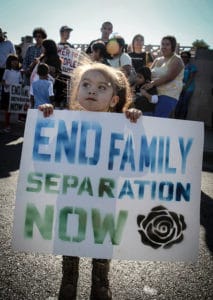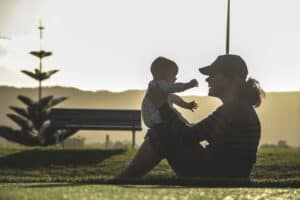It may not be evident on the surface, but a walk down Bleecker Street in the small city of Utica in upstate New York is a vastly different experience than it was 20 years ago. On the surface, the neighborhood may not appear much different—the bright greens, reds, and whites of O’Scugnizzo’s Pizzeria still call out to motorists driving through the street’s 600-block. Overgrown grassy lots still dot the landscape where crumbling buildings once stood, and huge early 20th-century Victorian homes are still ubiquitous, as they are in most of upstate New York’s burned-out rust belt towns. However, a more in-depth look reveals clues to demographic shifts that have defined Utica in the opening decades of the new millennium.
A three-story red brick house on Miller Street has been transformed into a Buddhist monastery. In the nearby East Utica neighborhood, Kenyan and Nigerian flags proudly wave where Italian banners once dominated. And on Court Street, just a few blocks from the city’s center, the Bosnian Islamic Association now inhabits the building that once housed Central United Methodist Church. These are only a few of the imprints Utica’s newest residents are leaving on their new hometown.
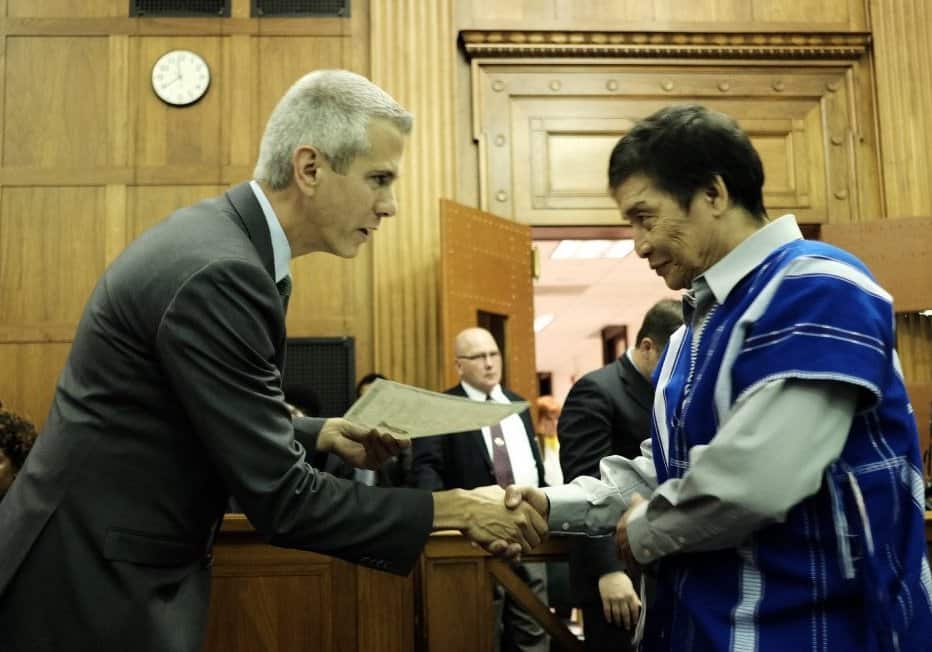
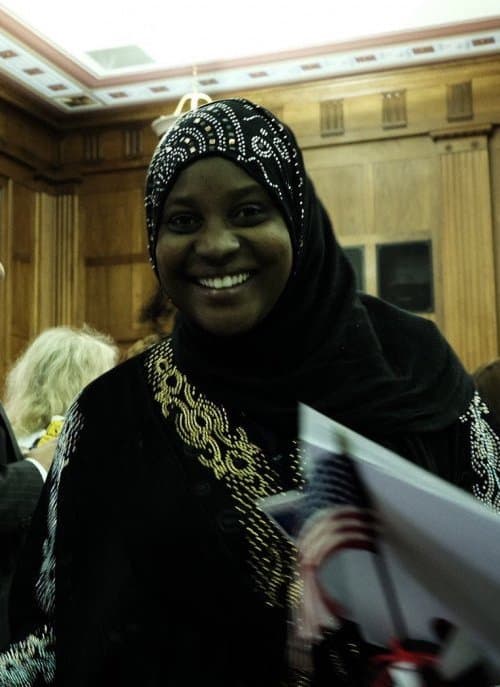 With a refugee population now exceeding 16,000, Utica is home to more refugees per capita than almost any other North American city. Odds are, if you pass by five people on an average Utica street, one of them came to the city as a refugee. If you are walking down Bleecker street, that number is more like one in two.
With a refugee population now exceeding 16,000, Utica is home to more refugees per capita than almost any other North American city. Odds are, if you pass by five people on an average Utica street, one of them came to the city as a refugee. If you are walking down Bleecker street, that number is more like one in two.
Utica’s reputation as one of America’s most welcoming cities is well-earned. A recent study showed that 69% of Utica residents believe the city has benefited from immigration. This level of community endorsement allows city leaders to support their refugee communities with extraordinary consistency.
“We take pride in how we successfully assimilate refugees and immigrants into our Utica family,” reads a statement from the office of Mayor Robert Palmieri. “The City of Utica appreciates the contributions and vibrancy that refugees and immigrants have brought to our city.”
At the crossroads of Utica’s relationship with its newest residents stands a two-story institutional beige and black building covering nearly the entire 200-block of Bleecker Street. The Center is Utica’s refugee resettlement and support hub, offering a wide range of services to help refugees successfully navigate life in their new city. Even its address—a building that once housed the now-defunct Utica School of Commerce (USC) —is an object lesson in the synergy between Utica and its refugee communities. If not for The Center, this building, like many other properties in the city, likely would have been abandoned when the school shuttered in 2016. It is just one of dozens of examples of how Utica’s refugee communities are breathing new life into this once-decaying rust belt town.
Today, four years of drastic federal funding cuts have pushed The Center to the brink of extinction. However, unlike many other resettlement offices across the nation, The Center is still hanging on, relying on a combination of grants, government funding, and donations from community organizations and individuals to continue its work.
Reverend Anita Mohr is the pastor of Our Savior Lutheran Church and a member of The Center’s board of directors. Mohr credits the agency’s survival to its talented grant writers and the adaptability of its staff.
“Some huge changes have had to happen,” she explains. “There are so many other things that happen there now—employment services, the office for new Americans, translation services, and more. Those things have helped us stay above water.”
Thulfiqar Al Saadi is a familiar face to nearly everyone at The Center. A resettled Iraqi refugee who now volunteers as a translator and ESL teacher, Al Saadi has seen the devastating impacts of immigration restrictions and funding cuts firsthand.
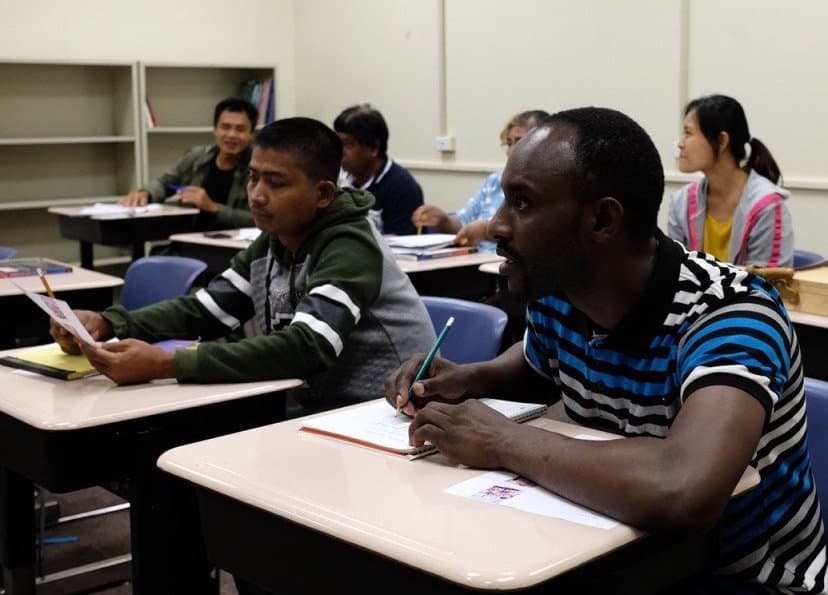
“They almost shut the refugee center down,” he explains. “We went from seeing 40 to 50 new families every month or two to only one family a month from Burma.”
Since President Trump added Burma to the list of banned countries last February, Al Saadi says that The Center now often goes weeks at a time without seeing a single new family. Even as the COVID-19 pandemic has torn through the city’s refugee communities in recent months, Al Saadi says that many services have had to be completely eliminated.
Involvement in refugee resettlement is not just a political cause for Al Saadi; it’s personal. He arrived in Utica in 2013 with his wife and children after serving as a civilian translator for the US Military during the Iraq War. His extended family, however, is still stuck in Iraq. He worries that they may still be in danger from local militia leaders who singled him out as a traitor because of his involvement with American forces.
“I had to move four times in less than two years,” he recalls. “I only got the chance to apply (for refugee status) after settling down in a safe place in 2011.”
Even his arrival in the United States didn’t stop the threats of violence against his family. In 2016, death threats against his parents and younger brother forced him to return to Iraq. He enlisted the help of a few friends from the local police force, and together they smuggled his family out of their neighborhood in the middle of the night. Since then, Al Saadi, now an American citizen, has been working tirelessly to help them get into the United States, but his efforts have been blocked at every turn.
“Trump removed Iraq from the list of banned countries four years ago,” he says. “But the refugee program there has been completely shut down. They’ve stopped even giving interviews.”
Al Saadi worries for his family’s safety but remains optimistic. A devout Muslim, Al Saadi found comfort in seeing President Biden attend church on inauguration morning. He sees Biden’s faith as a good sign for the next four years of immigration policy.
“If a man fears God,” Al Saadi says, “I have no reason to be afraid of him.”
Rev. Mohr shares Al Saadi’s optimism but cautions that the damage done by the previous administration will not heal quickly. Even with a bold proposal in the opening weeks of the administration raising the refugee cap to 125,000, Mohr knows it will take years for the actual number of resettled refugees to reach pre-2016 levels.
“The Trump administration removed many of the programs that helped people get ready to be refugees,” she explains. “This pipeline has to be reestablished before we can go anywhere.”
Al Saadi experiences this broken pipeline on an almost daily basis working on his parents’ case. In recent weeks, he has contacted Senator Schumer’s office, making them aware of his case.
“God created the whole world to work together,” she explains. “Refugees are a part of what makes the world work.”
“They are very understanding people,” Al Saadi explains. “They are working hard to get my parents and my little brother into the country.”
Even though President Biden has already overturned the Muslim travel ban, Schumer’s office has not been able to move the needle so far. In Iraq, Trump-era immigration policies stalled the P-2 refugee resettlement program for so long it could take years to rebuild. Until this damage is repaired, Al Saadi’s family will have to wait.
For Rev. Mohr, too, working to support the city’s refugee communities is a personal mission. She views her involvement as an outward extension of her inner life of faith, an act of personal submission to what she sees as God’s plan for the world.
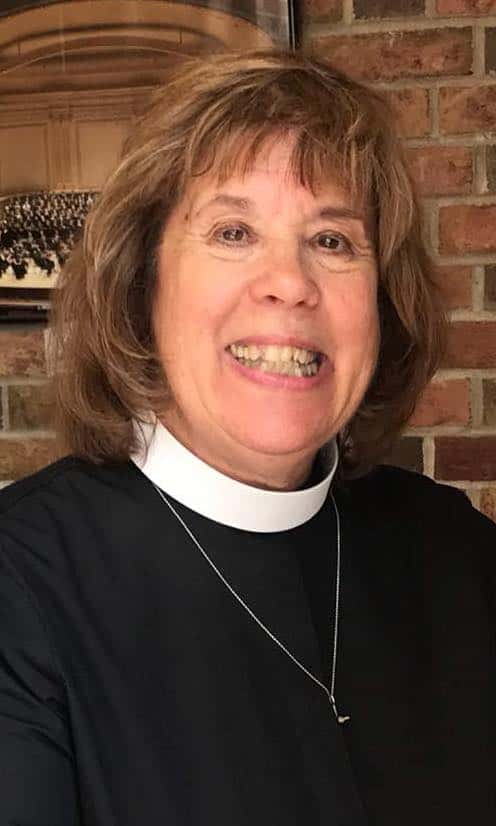
“This is what ‘for God so loved the world’ means,” she explains. “It means that all the world deserves a safe place to live, that Shalom should be the way the world works.”
Rev. Mohr believes churches have focused too much on the faith as an individual spiritual experience rather than seeing it as an invitation to pursue Kingdom principles like justice and peace. To her, this “just me and Jesus” approach is reductionist, failing to do justice to the teachings of Christ.
“I think it’s a very thin way of looking at what it means to be Christian,” she says. “Jesus talked about the Kingdom of God being among us. That means finding ways for the whole world to live in harmony with one another.”
One critical piece of this Kingdom work, for Rev. Mohr, is a commitment to supporting and advocating for refugees. She has dedicated herself to it, not just because refugees have been good for the city, but also, more importantly, because it is the right thing to do.
“God created the whole world to work together,” she explains. “Refugees are a part of what makes the world work.”
For now, life on Bleecker Street is still moving forward. Asian markets continue to bustle with activity, immigrant families renovate once-abandoned homes, and imams, monks, priests, and pastors lead prayers and rituals in more than 40 different languages. Four years of anti-immigrant rhetoric and policy have eroded the foundation holding these communities up, but hope still burns bright that it can be rebuilt. Despite recent obstacles, the City of Utica continues to answer God’s call to welcome the immigrant and, in the process, challenges people of faith across the nation to join them in the Kingdom work of bringing this world one step closer to Shalom.
 Jason Koon is an ordained Baptist minister who now writes at the intersection of faith, culture, and politics. He lives in Western North Carolina with his wife and two teenage daughters.
Jason Koon is an ordained Baptist minister who now writes at the intersection of faith, culture, and politics. He lives in Western North Carolina with his wife and two teenage daughters.

